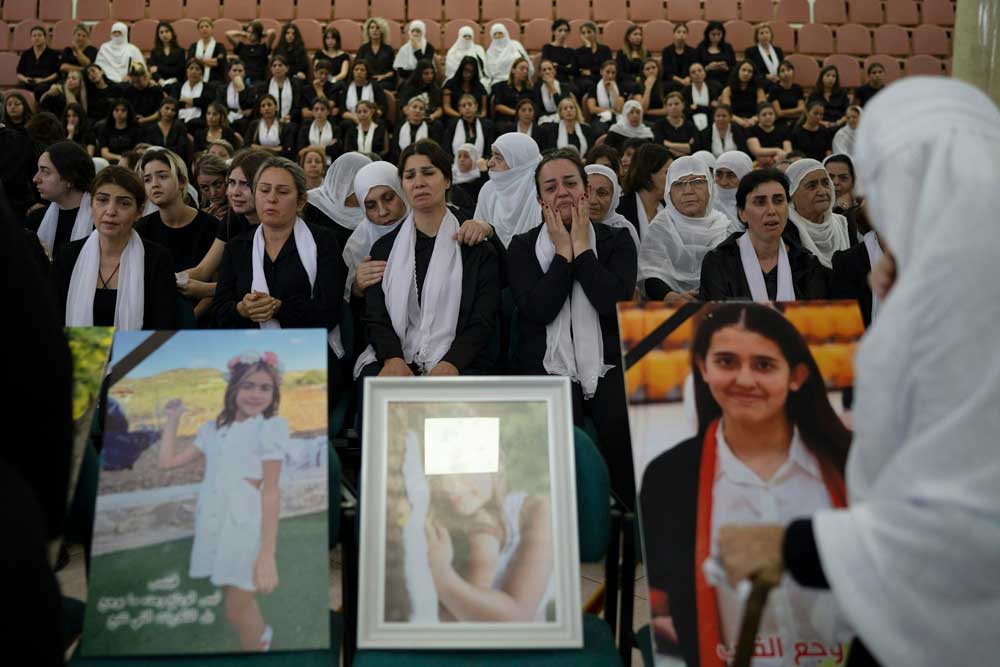
By Rami Zeedan
The village of Majdal Shams has been in mourning since July 27, 2024: the day a rocket hit a soccer field, killing 12 children and wounding tens more.
Throughout Israel, people have been outraged at the strike – the deadliest day for the country’s civilians since the Hamas-led massacre on Oct. 7, 2023, sparking the current war. But Majdal Shams is home to a community whose relationship with Israel is doubly complicated: Druze residents of the Golan Heights, which Israel captured in 1967 and annexed in 1981.
The Druze, an ethnic and religious group, live throughout the Middle East. In Israel, they are considered the most integrated of the country’s Arab minority. However, they have faced discrimination and have struggled to define their place in Israeli society – particularly since 2018, when the country passed a law affirming its identity as the state of the Jewish people.
I’m a historian and political scientist focusing on modern Israel and ethnic minorities, including the Druze. As a Druze myself, I am deeply connected to the rich history, culture and complex dynamics of my community within Israel and the broader region.
The Druze worldwide
The Druze, a monotheistic faith known as al-Tawhid, or Unitarism, originated around 1000 C.E. in what is now Egypt. For a short period, the faith’s leaders extended “al-da’wa,” or “the call,” inviting people to embrace the new faith.
Since then, however, one must be born to Druze parents to be considered a member. Outsiders are not allowed to convert.
The Druze share some traditions with other Muslims and Arabs, such as celebrating the holiday of Eid al-Adha and following similar dietary restrictions. The central tenet of the Druze faith is the belief in the reincarnation of the soul after death, which helps maintain a sense of unity and identity among the Druze across borders.
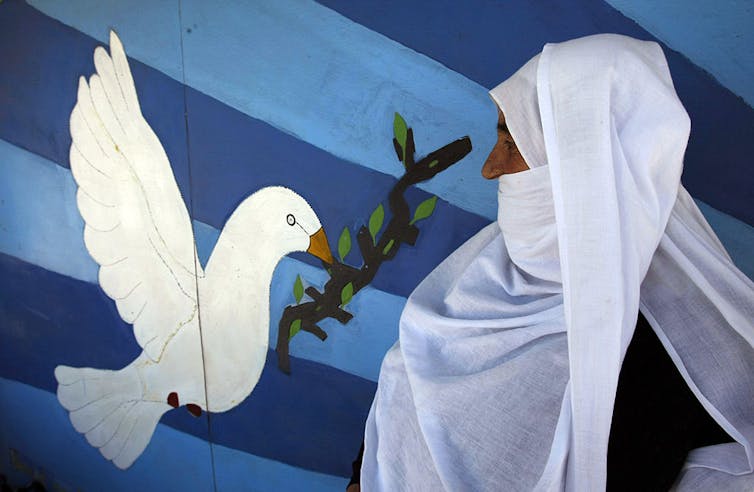
Menahem Kahana/AFP via Getty Images
The total number of Druze worldwide is uncertain, with estimates between 1 and 2 million people. The majority reside in the Middle East, particularly in Syria, Lebanon, Israel and Jordan. Druze diaspora communities can be found in various countries in Europe, North America and South America, as well as Australia.
The Druze in Israel
The Druze presence in the region of Palestine, which is now Israel and the Palestinian territories, was once robust but waned by the end of the Ottoman period. In the first half of the 20th century, during the British Mandate for Palestine, the Druze population was less than 10,000.
Following the 1948 Arab-Israeli War – what Israelis call the War of Independence and Palestinians call the Nakba, or the “catastrophe” – the Druze were permitted to remain in their villages in the newly established state of Israel.
As of 2024, the Druze population in Israel, including the Golan Heights, is approximately 152,000 – less than 2% of the country’s population. The vast majority reside in Druze-majority villages and towns.
The majority of Druze in Israel identify as Druze, Arab and Israeli. Like most Jewish citizens, Druze men are obliged by law to serve in Israel’s military, which has contributed to their integration into Israeli society and politics.
In recent years, many Arab-majority localities have experienced improvements due to increased government funding for education, public transportation and other services. Like other Arabs in Israel, however, the Druze face disparities in employment, income and access to essential services compared with Jewish Israelis.
At the top of these struggles are increasing crime rates and lack of housing.
For example, the 2017 legislation called the Kaminitz Law allowed the government to take tougher measures against illegal construction, including demolishing homes and levying expensive fines. Arab-Palestinian citizens, including the Druze, accuse officials of disproportionately targeting their communities. They argue that by not investing as much in planning housing in Arab-majority areas, the government leaves them no other choice but build on their own private lands without permits.
The passing of Israel’s “nation state law” in 2018 marked a significant juncture for the Druze. Since the country’s founding, it has walked a fine line of being both a “Jewish and democratic” state. But the 2018 law defined Israel as the nation-state of the Jewish people, without defining the country’s democratic characteristics. It downgraded Arabic from an official language to one with “special status” and treats “the development of Jewish settlement as a
national value.” Critics feared it could signal further discrimination against the non-Jewish minority, who make up about 20% of Israel’s population, including the Druze.
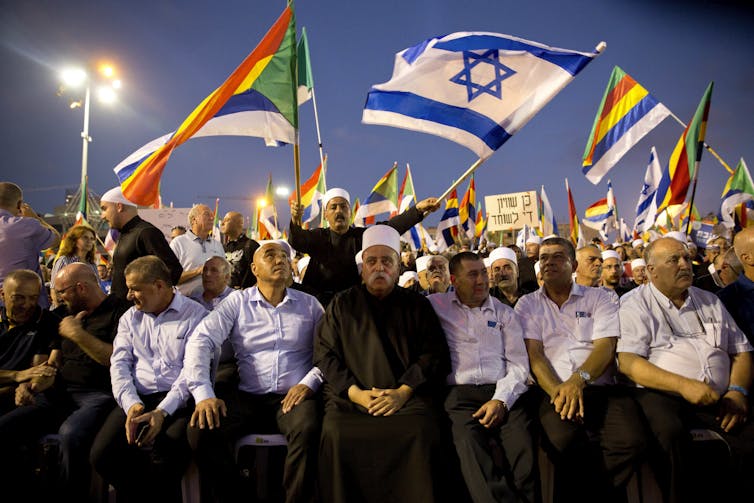
AP Photo/Sebastian Scheiner
The Druze in the Golan Heights
Israel captured the Golan Heights from Syria in 1967, during the war that Israelis call The Six-Day War, while Arabic speakers call it Al-Naksa, or the “setback.” The area was annexed in 1981, although the United States is the only other country that recognizes the Golan Heights as part of Israel.
The Golan Heights is home to four Druze villages, with about 25,000 residents. Majdal Shams. the site of the July 2024 attack, is the largest.
Traditionally, the Druze of the Golan consider themselves Syrian. Most have refused to become Israeli citizens, even though the Israeli annexation law allows them to do so. However, an increasing number of Druze in the Golan have applied for citizenship in the past decade, and an estimated 20% to 25% are now Israeli.
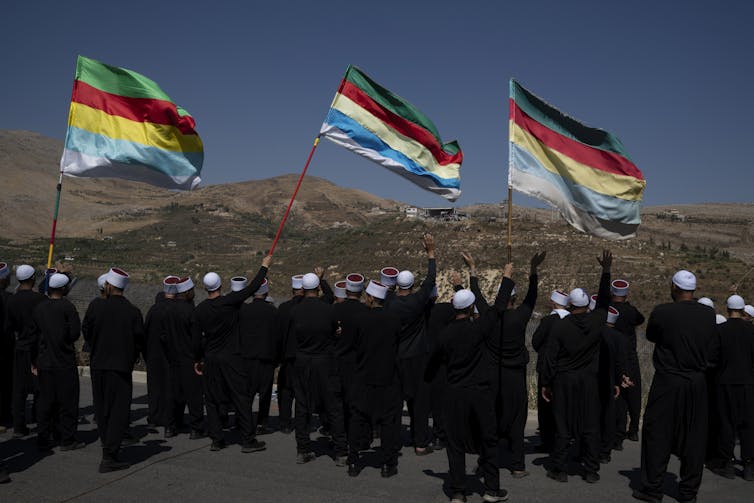
AP Photo/Leo Correa
Many Druze from the Golan also attend Israeli universities – a significant shift, since, before the Syrian civil war, they were allowed to cross the border and study in Syrian universities tuition-free.
These changes are attributed to fallout from the conflict in Syria, educational and economic considerations and Israeli policies. For example, municipal elections in the four Druze localities were held for the first time in 2018 – though many Druze in the Golan continue to oppose them, as a statement against Israeli control.
Facing the future
Israel blames Hezbollah for the attack, while the Lebanese militant group has denied responsibility. After the rocket strike, some Druze in Israel called for retaliation, while Druze in the Golan Heights called for calm.
Druze religious leaders in Lebanon, Syria and Israel urged restraint, but they also called for governments and the international community to bring those responsible for the incident to justice and called for the end of the ongoing war in Gaza.
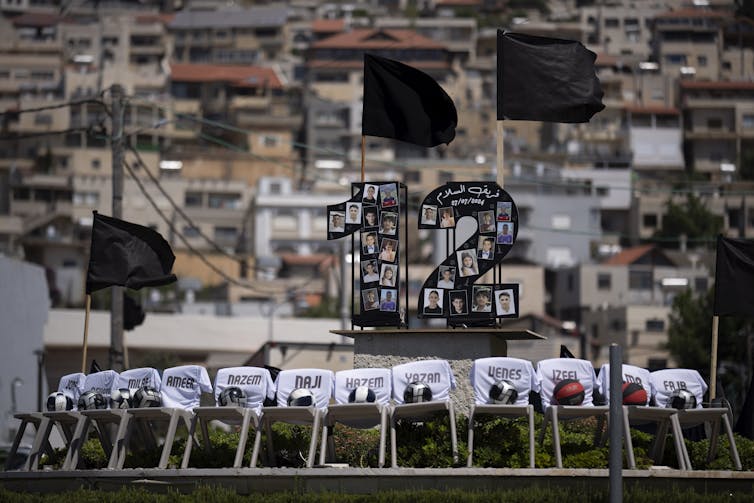
AP Photo/Leo Correa
In my view, the attack will affect Druze communities significantly. It might drive the Druze of the Golan further away from their Syrian identity, creating a more shared destiny with Israel. Israel could use this moment to expand the integration of the Druze of the Golan into Israeli society, similar to the other Druze in Israel. On the other hand, the incident could create further rifts within Lebanon and Syria between the Druze and other communities.
![]()
Rami Zeedan is Associate Professor of Israel Studies at the University of Kansas.





























Deirdre says
It seems by now they should know who it is that did the strike, although Israel denies it, apparently the iron dome has failed more than once and hit the area. If Israel is the only one that has investigated the matter, then obviously they’re going to say they had nothing to do with it. They deny every horrific thing they do.
If Netanyahu can come to Congress and got 49 standing ovations because he says he hasn’t killed civilians and they give them more than enough food, I would suggest questioning his honesty.
Our government is so corrupt, it sickens me, we are fully in partnership with Israel in massacring thousands of innocent people.
It would be pretty good to know the facts about the Golan Heights incident before Israel uses it as an another excuse to murder more civilians, I’m sure the people in Lebanon are filled with dread. Hezbollah has historically acknowledged their own stray missiles, and if they did hit the area it was obviously an accident.
I hope the fate that has befallen the Palestinians in Gaza doesn’t spread throughout the region, it doesn’t look like Harris will cut off Israel either (although they have a better chance with her than Trump!). She at least acknowledges the suffering, and is apparently willing to talk to pro Palestinian groups. I know her hands are tied as long as she’s vice president and Biden continues to be Bibi’s puppet. AIPAC sure got its money’s worth!
I can’t stand to hear the talk of what a great man Biden is, and all he’s done for humanity. No one with a soul would facilitate this genocide in every possible way, when even the threat of cutting off money and weapons would end it. None of this would be happening except Biden is financing it with our tax money.
Even Republican presidents have put the brakes in Israel in the past, but Biden has been the recipient of more AIPAC money than any other politician in history. Coincidence?
Although most politicians we thought we voted for have sold out to AIPAC, the munitions industry and Zionist millionaires, I still pray there’s some Palestinians left that haven’t been shot, blown apart, burned to death, tortured and starved by the time November rolls around.
If America won’t cut them off I think their only hope to end this genocide is if the other Arab countries go to war against Israel, this so disturbing, but apparently no one else in the world can stop it because the US won’t let them. The UN, ICC and ICJ are powerless. Why do we even have these organizations if that can’t stop this?
When a massive war begins I won’t be surprised, I’m just surprised it hasn’t started already. When we start sending America troops, will more Americans protest the fact we’re fighting someone else’s war? When will the nukes fly?
Will our own troops have a heart, (unlike the IDF) as they did when they saw the concentration camps in Europe, and liberated so many Jewish victims from that holocaust? If anyone thinks sending American troops is unlikely, wait.
As long as Netanyahu is in power, no hope for a cease-fire. How long can people go without food and water? Why can’t the Israeli people get rid of him?
I don’t know why people keep talking about working out a cease-fire deal when he will never ever agreed to one, although he will continue to blame Hamas. Why would anyone agree to give back the hostages and then let them finish the ethnic cleansing? Even the bodies of the hostages are important to their people.
A lot of Americans just look at the headlines and not the details, it’s shocking anyone would support what Israel is doing if they knew all the facts. They buy into the propaganda, but if anyone cares about Israel, they should acknowledge this war is destroying it. The Israeli people do!
Their economy has collapsed, the world is disgusted with them, they’re a pariah State, and these multi front wars will only serve to destroy them.
When enough Israeli people leave they will be a minority in the area, and lose the power to continue enslaving the Palestinians in Gaza, the West Bank and Golan Heights.
They’ll never see their hostages again, Netanyahu doesn’t care, it’s just an excuse, he needs to retain power to stay out of jail.
His partners in crime are still convinced they can get rid of all the Palestinians and take their land, but I don’t believe that will happen, the Palestinian people will prevail. I just hope they gain their freedom after having lost everything, with the most unbelievable suffering I’ve ever seen. How is this happening in the 21st-century?